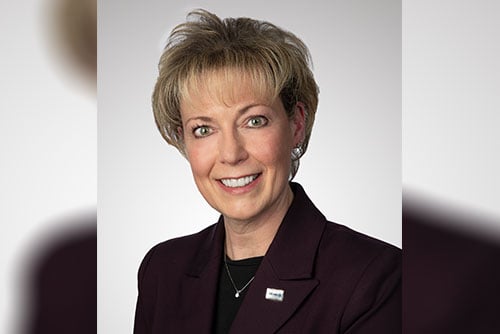

The Canadian insurance market is in a state of transition. After some challenging years, notably 2017 and 2018, with high frequency and severity adverse weather losses, insurers are starting to tighten their belts and reassess how much capacity they want to commit to the marketplace. In such a volatile business environment, this is “an exciting time” for Linda Regner Dykeman (pictured) to take over as chief agent of Canada at Allianz Global Corporate & Specialty (AGCS).
“The market has changed very rapidly over the last 12 months or so in Canada,” said Dykeman. “Insurers have had a few challenging years, mainly due to weather events and natural catastrophes causing some severe losses. I would add that there have been a few underlying issues, like water damage (where loss frequency has become a real problem) and fire (where we’ve seen some really severe losses). Profitability in certain market segments has been challenging for the entire industry, and as a result, some markets have started to react by retracting capacity.”
As the name of the firm suggests, AGCS focuses on corporate and specialty insurance, specifically for larger accounts. In July, Dykeman took the leadership reins over from Ulrich Kadow, who has moved into a new role as AGCS’s global head of marine. She described AGCS Canada as being in “really good shape” and in “a position of strength” to deal with some of the Canadian market changes.
Read next: AGCS creates new regional head
AGCS’s recent success in Canada is partly down to its specialty focus areas. While the wider marketplace battles market swings with the weapon of price, AGCS comes armed with expertise and a wealth of global knowledge from over 200 countries around the world. As Dykeman put it, AGCS Canada is “not completely a price play.” Rather, she said corporate entities seek out the insurer for its global expertise in underwriting and risk management.
“We pride ourselves on trying to help the client improve their risk,” Dykeman told Insurance Business. “I think that’s one thing we do differently to our competition in that we’re always looking for ways to improve a risk and prevent loss. It’s our philosophy that clients don’t want to have losses; it’s not good for their business. In recognizing that, we do our best to focus on risk control and trying to find ways to prevent losses from happening in the first place.
“In some high-severity classes of commercial business [like long-haul trucking, residential realty, and the food processing business] the Canadian market’s starting to see some significant rate increases. At AGCS, because we focus on the larger and mid-sized accounts, we can look at each client individually in terms of what sector they’re in, their loss history, how they’ve managed their business, and we can price each individual account accordingly. We typically don’t take a broad-brush approach, like you might see from some of the more generalist insurers.”
One sector that has been particularly challenging for Canadian insurers in recent years is residential realty – apartment complexes, condos and so on. The sector has been plagued by a high frequency of water damage losses, as well as a number of high-severity fire losses. Despite its challenges, many generalist insurers in Canada have “treated residential realty as a commodity,” according to Dykeman, in that they all offer more or less the same coverage.
“A lot of the generalists write residential realty, so there’s been a lot of competition in the marketplace but not a lot of stringent underwriting, which has driven rates down to the point where they don’t necessarily reflect the exposure. As a result, some players have reduced their capacity dramatically in that space,” Dykeman commented. “In any sector where there’s high-severity risk potential, we’ve started to see insurers pulling back a bit. It’s a general theme across commercial lines for the industry right now.
“However, I do believe some of these market challenges have caused a bit of a shift in the industry. I think we might be at a tipping point where we’re moving back to basic underwriting, with underwriters asking the right questions in order to understand the risk and price it accordingly. At AGCS Canada, we feel confident that we’ll be able to continue to excel in the Canadian marketplace as it evolves. As a global insurer, we bring a lot to the table and we have expertise around the world that differentiates us from the competition.”
